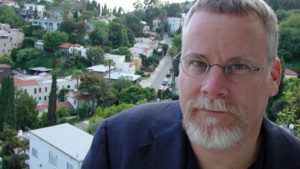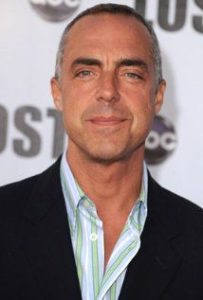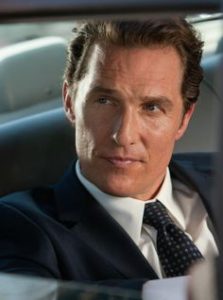When Harry Met Mickey

Appeared in Creative Loafing, October 15, 2008
Michael Connelly doesn’t fit the profile of a Florida writer. His stories take place in sunny Southern Cal and lack the high-octane mayhem and rampant alligators of this state’s mystery novels. But here he is, writing his magnificent books from his fortified compound in Tampa, turning crime fiction into Great Lit.
Connelly spent his wonder years in South Florida, went to the University of Florida and worked for newspapers in Daytona Beach and Fort Lauderdale before heading west. He covered cops for the Los Angeles Times for a decade, writing and rewriting novels until he finally got published.

Nineteen novels down the road, Connelly is not only “the best mystery writer in the world” (GQ said that), but also that rare writer whose work elevates a whole genre. At the beginning of his career, Connelly’s books were well-received as good, solid mysteries. But after a few novels exploring the soul of his cop-protagonist, Connelly kicked his work into a higher gear. He spelunked to the depths of character study, writing with a lyricism rarely found in mysteries. He also decided that after soaking up L.A. ambiance for years, he could finally come home. He’s been living in Tampa for a decade, just a two-hour drive from his beloved Florida Gators.
Harry Bosch, Connelly’s continuing character, is one of the great creations of modern fiction. A Vietnam vet with authority issues, he’s been working his way through the LAPD for nearly two decades. He retired once but found that PI work wasn’t for him. So he became a closer — a cop who takes dead cases, brings them back to life and finds justice.

Bosch is a piece of work. He mainlines jazz and tobacco and now and then buys himself a bastard of a hangover. And he has a code: “Everybody counts or nobody counts.” In an increasingly corrupt world, he’s the principled cowboy in modern-day High Noon morality plays. Did I mention he was an illegitimate child and his mother was murdered? This guy has a chip on his shoulder the size of K-2.
Connelly unfurled a series of classic novels featuring Detective Bosch: City of Bones, Lost Light and A Darkness More than Night, to name a few.
Way back in his second published novel, Connelly massaged Bosch’s past and found his father, a famous defense attorney — ironic, since Bosch wound up working the other side of the desk. Of course, this newfound pop died just after Bosch met him. Connelly also tossed off this morsel in the novel: Bosch had a half-brother.

Fifteen years later, when Connelly decided to take a brief sabbatical from cop novels to tackle a courtroom drama, he brought in the brother, Mickey Haller. Haller, like Bosch, was unconventional: He didn’t have an office, but instead worked out of the back seat of his Lincoln Continental, a big black boat driven by a parolee.
Like all of Connolly’s stories, the lawyer-in-the-car thing grew organically. He happened to sit next to a gent at a Dodger game years ago who actually did run his practice out of the back seat. He took that idea and grafted it onto a character he cobbled together from a couple of lawyer friends — one from Tampa — and followed around an old college classmate, Dan Daly, as he worked his criminal-defense practice in Gainesville, Fla. Daly, whom Connolly describes as “Atticus Finch with a ponytail,” said something that inspired the theme for his novel: “There’s no client as scary as an innocent man.”
The Lincoln Lawyer (2005) became Connelly’s best-selling book. He had a second No. 1 New York Times best-seller that year with the Bosch book, The Closers. Two No. 1’s in one year was a feat envied by any slob who ever struggled to make money from writing. Two in one year was like showing off.
A meeting between Harry and Mickey was inevitable, of course, but Connelly wasn’t sure if he was ready for it until an editor’s request two years ago made it happen sooner rather than later.
The Brass Verdict is the second full Mickey Haller novel, with a major supporting role played by Harry Bosch. There’s no brotherly bonding — Bosch knows about their relationship, Haller does not — but they do inch closer to each other as they are drawn into another tangled web of murder.
As the book starts, a lawyer is murdered and Haller — who’s taken a couple of years off recovering from the life-threatening action in Lincoln Lawyer — inherits the cases. Not only does he have a doozy of a murder trial looming (thanks to his colleague’s death), but Harry Bosch also is sticking his nose into things, convinced that whoever killed that first guy might want to bag another lawyer.
Connelly keeps getting better. You can read these books out of order and catch glimpses of Bosch (and now Haller) at different points of their lives. A newbie can pick up Brass Verdict and enjoy it; no prior knowledge is assumed. But if you are steeped in Connelly Land, you appreciate each new, further exploration of the mind of Harry Bosch. If there is one complaint about the new book it’s this: We need more Harry. The assumed conflict between the police detective and the criminal defense attorney does not occur. Connelly is much too smart and talented to go for the obvious.
When he was in college at Gainesville, Connelly figured he would study building construction and go into the family business. Then he walked into a movie theater showing Robert Altman’s The Long Goodbye, and things changed. The film led him to the source material, the novel by Raymond Chandler. Soon, Connelly had absorbed Chandler into his sinews, admiring his ability to take crime stories and weave great art from the sordid elements. Connelly has taken the mystery novel to a higher level. Like Chandler, Connelly’s books will endure.
